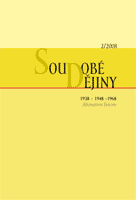Nejhorší možná varianta. Srpen 1968
The Worst Possible Version: August 1968
Author(s): Oldřich TůmaSubject(s): History
Published by: AV ČR - Akademie věd České republiky - Ústav pro soudobé dějiny
Summary/Abstract: This article mostly considers the conditions and reasons that culminated in the Soviet-led military intervention with four other Warsaw Pact states in August 1968 as the primary factor determining future Czechoslovak developments. The author first takes issue with two interpretations that point to the causes of the intervention as being in Soviet policy. The fi rst interpretation is by Jiří Fidler, a Czech historian, who considers paramount the military aspect, that is to say, the endeavour of the Kremlin to change the strategic balance in central Europe by deploying Soviet troops and nuclear weapons in Czechoslovakia. The author of the current article argues that this explanation is based on mere hypotheses unsupported by the archive records. He considers even more vague and unfounded the interpretation, typical of Western Kremlinologists before the Changes of late 1989, which sees the intervention as resulting from a power struggle amongst factions at the top level of the Soviet leadership. The decision to intervene militarily was, he argues, the result of an overall Soviet assessment of the situation in Czechoslovakia and the leadership’s endeavours to maintain the Communist régime here. On this basis, he then considers the circumstances that could – most probably in conjunction with each other – have prevented the intervention. An important factor that would have acted as a brake in this sense, he argues, was the possible involvement of the United States, whose timely warning of the negative consequences of the intervention for the policy of détente would have considerably complicated Soviet decision-making. Certain possible ways to infl uence events were also open to the Czechoslovak Reform Communists led by Alexander Dubček, whose waffling between the demands of the Czechoslovak public and the pressure of the Kremlin provoked the Soviets and also gave them the impression of Czechoslovak helplessness. By contrast, the Czechoslovak leaders could have chosen either to resist Moscow more openly or to retreat tactically to her demands.
Journal: Soudobé Dějiny
- Issue Year: XV/2008
- Issue No: 02
- Page Range: 318-340
- Page Count: 23
- Language: Czech

